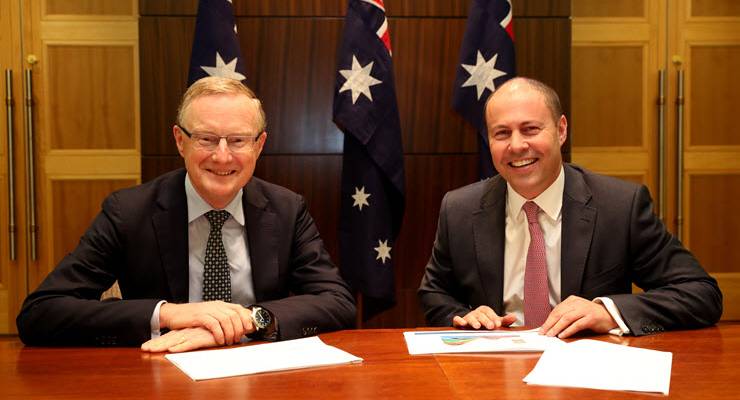
Would you be alarmed if the Reserve Bank (RBA) starting flooding the country with money to buy government bonds? We’re talking about billions of dollars. And it would be a big drop — kind of like opening the window and throwing cash into the street.
The technical term is “quantitative easing”. It’s a practice that hasn’t been used in Australia since the 1930s even though the central banks in the US, Britain and many European nations have been doing it since the Great Recession. It’s been talked about here since the middle of the year, when it was all too apparent the succession of official interest rate cuts by the RBA wasn’t stimulating economic activity or boosting wages. Now it’s crunch time.
On Tuesday the RBA will meet, and it’s almost certain the board will cut rates again to a new record low of 0.75%. RBA governor Philip Lowe all but confirmed it last week, citing continued weak signals in the domestic economy and new global conditions as probable reasons to make further monetary easing likely.
After tomorrow’s cut there is another expected in November and, if nothing happens by the February RBA board meeting, the sluice gates will open on the money pipeline.
Those global issues Lowe cited are real and worrying — the Chinese economy is growing at its slowest rate for three decades, European nations are slipping back into recession and the US is awash with uncertainty.
However, the real guide to Lowe’s thinking can be found in his address to the biggest central bankers’ gabfest on the circuit, the gathering in Jackson Hole, Wyoming in August. There, he said interest rates were not the best lever to pull to achieve desired outcomes, but that the other levers were hard to move or were stuck (translation: governments won’t act).
He made no secret of his favoured lever: investment in infrastructure at a time of very low interest rates. “If this lever could be used, it could boost aggregate demand and support future productivity,” said Lowe. “It is worth recalling that very low interest rates increase the value of projects with very long-lived payoffs. Some well-chosen infrastructure projects would fall into this category.”
The RBA has been singing this song for months at varying levels of volume, stopping short of shouting. After tomorrow’s expected cut, they might return even louder. So far, the Morrison government has been at best reluctant — although the prime minister gave a hint there might be some action up the policy sleeve during his US visit last week. Treasurer Josh Frydenberg gave a slight nod to tax breaks for business in next May’s budget, but quickly retreated when it was pointed out foreshadowing this seven months out might be counterproductive.
On the face of it, the government shouldn’t be so shy. They have a budget that’s in good health. However, their nervousness is driven by a desire to protect the surplus at almost all cost. Ministers say there are strong political and policy reasons for doing this — they believe the public likes the idea of getting “back in the black”, which is undoubtedly true. Also, they want to maximise the amount of money in the rainy day fund in case economic conditions worsen domestically and go seriously pear shaped internationally.
On this last point, China is the very large panda in the room. The slowing of the domestic economy has prompted Beijing to crank up the engines of growth which has increased demand for our commodities, particularly iron ore and coal. This is good for us and will almost certainly continue regardless of political developments.
However, Australian-Sino relations are now as bad as they have been since we established diplomatic ties just under half a century ago. As recently as March this year, China stopped unloading Australian imports because it didn’t like a speech in Singapore by then-defence minister Christopher Pyne.
Recent visitors to Beijing say everyone in senior political positions is talking about Liberal backbencher Andrew Hastie’s provocative anti-China op-ed in August and the mood is dark. It would only take a nod in the politburo and our goods would be left on the docks. The inflow of Chinese students could dry up. The economic impact would be swift and dramatic.
In this climate, throwing money out the window would be a frightening sight indeed.
Worried about the government’s handling of the economy? Send your comments to boss@crikey.com.au. Please include your full name for publication.
Dennis Atkins is a freelance writer based in Brisbane where he was a national political editor during the Howard government. He is filling in for part of the time while Bernard Keane is enjoying a break.








The coalition is hoist by its own petard, by brainwashing the dumbed down electororate and for purely political aims it has frightenened the public into believing that a suplus budget is the only fiscally correct way to go in australia`s now fragile economy, and the coalition are now caught in their own economic bullshit, to get the funding for their tax cuts for their rich mates over the line they now have to find the money, they`ve already stripped the peasants on newstart and are still over $2 billion short, so now its the pensioners/ superannuants turn followed by an increase in the GST to raise the cash to help the multi nationals and big mining get their profits up to pay their CEO`S their big paychecks and bonus`s, and I must say I`m enjoying this unfold, the dumbed down voter base are like turkeys voting for xmas as they endorse scomos agenda, while their incomes get smaller and their bills get higher the idiots cling onto scomos trickle down dogma and still they hang onto the conservatives working poor policies like lemmings over a cliff and I`m loving it , watching these clown vote themselves into the poor house and get their just reward for being stupid has a certain justice to it, keep it up fools, and yeah, I know, you did`nt vote for him, someone else did, heard it all before suckers, just tighten your belts and stop whining.
Good post, but..
I didn’t vote for him, someone else did. And I’m collateral damage in all this. And I doubt I’m alone.
Love it!
The big con that a national budget surplus will cushion us all against bad times continues. The national accounts are not a jar of small change you keep in the kitchen cupboard to pay for the milk. The only demographic that will be cushioned when things go pear shaped and they will, (anyone care to check out what the knock on from the drought and fires is going to be for example), are the mates of the government. The rest of us will be told to suck it up.
John Maynard Keynes had it right in the 1930s when he espoused his economic theory about curing the Depression that was spend, spend, spend on infrastucture to get the wheels moving and bugger the surplus.
“They have a budget that’s in good health. However, their nervousness is driven by a desire to protect the surplus at almost all cost. Ministers say there are strong political and policy reasons for doing this — they believe the public likes the idea of getting “back in the black”, which is undoubtedly true. Also, they want to maximise the amount of money in the rainy day fund in case economic conditions worsen domestically and go seriously pear shaped internationally.”
None of this is true and you should simply say so, rather than just quickly passing through – its the “view from nowhere”.
The budget is an outcome of activity in the broader economy. Trying to run a surplus when growth is 1.4%, unemployment is 5.3% and household debt is at a record level is dumb.
That the public think “back in the black” is good, does not make it true. Discuss with regard to Australian household debt.
There is no such thing as a “rainy day fund” for a country which has a sovereign currency. Discuss.
It has been crunch time for the Australian economy and environment for over 6 years. The Muppets have deployed zero sensible policy over that period. All they have done is pull accounting tricks and cut productive social spending to get the budget back in surplus, a vacuous pursuit, particularly with near zero interest rates. To put the Muppets’ obsession with surplus in perspective, since Federation 118 years ago, the federal budget has been in surplus only 27 times. 11 of those were prior to WW1 and were basically balanced. So, if in 91 years out of 118, the federal budget has been in deficit, why is Australia’s government debt so modest compared to many other developed nations? Simple, inflation has done the trick every time. That makes a mockery of the trope that government debt constitutes some sort of intergenerational inequity. The truth is this Muppet government has no ideas other than the tired and disproven rhetoric of neo-liberalism. And regrettably, that is what ‘we’ voted for because most wanted Bill Shorten voted off ‘political survivor’, the reality sitcom our politics has become.